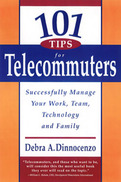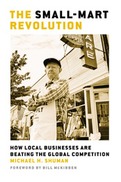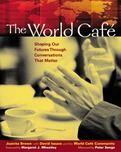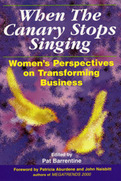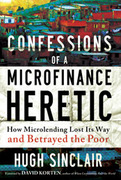In 101 Tips for Telecommuters, seasoned telecommuter Debra Dinnocenzo shares her practical, easy-to-implement "action tips" for making telecommuting as efficient and productive as possible. Written for full-time, occasional, and aspiring telecommuters, this helpful book covers everything from managing one's own time, balancing telecommuting with family demands, and working effectively with others from afar to networking the "virtual" way, getting a grip on technological overkill and even resisting the ever-beckoning refrigerator when working at home!
Dinnocenzo offers useful advice on special self-management factors to consider when telecommuting; how to keep in touch with all the people-coworkers, managers, support personnel, customers, and others-who make up your telecommuting world; and even how to nurture crucial ties with suppliers, vendors, and service providers.
In the new age of professional mobility, 101 Tips for Telecommuters is the perfect guide for the millions of Americans who want to succeed in this exciting and challenging new way of work.
-
A concise, user-friendly guide for telecommuters, written by a veteran telecommuting executive with more than a decade of first-hand experience as both a telecommuter and telemanager
-
Focuses on the myriad tasks and roles telecommuters must handle on a daily basis
-
Includes a Telecommuter Self-Assessment Checklist so readers can determine if telecommuting is right for them, a Telecommuter Start-Up Guide, and a Telecommuter Resource Guide to refer to whenever telecommuting gets tough
Al Olaimy sets the stage by providing a quick, thoughtful grounding in the birth of Islam in a barbaric Game of Thrones–like seventh-century Arabia, the evolution of fundamentalist thought, and the political failures of the postcolonial period. She shows that terrorists are motivated by economic exclusion, lack of opportunity, social marginalization, and political discrimination. This is why using force to counter terrorism is ineffective—it exacerbates the symptoms without treating the cause. Moreover, data shows that military interventions led to the demise of only 12 percent of religious terrorist groups.
Combining compelling data with anecdotal evidence, Al Olaimy sheds light on unorthodox and counterintuitive strategies to address social woes that groups like ISIS exploit. For example, she describes how Indonesia, the world's most populous Muslim country, has decreased terrorism while paradoxically becoming more overtly religious. Or how Mechelen, the city with Belgium's largest Muslim population, adopted integration policies so effective that not one of its 20,000 Muslims left to join ISIS. Using religion, neuroscience, farming, and even love, this book offers many inspiring examples and—for once—an optimistic outlook on how we can not just fight but prevent terrorism.
- Shows exactly why locally owned businesses are far more beneficial to their communities than massive chains like Wal-Mart
- Outlines specific strategies small and home-based businesses are using to successfully outcompete the world's largest companies
- Advises consumers, investors, policymakers, and organizers on how they can support the the local entrepreneurs who contribute to their communities
2005
Filled with stories of actual Cafe dialogues in business, education, government, and community organizations across the globe, this uniquely crafted book demonstrates how the World Cafe can be adapted to any setting or culture. Examples from such varied organizations as Hewlett-Packard, American Society for Quality, the nation of Singapore, the University of Texas, and many others, demonstrate the process in action.
Along with its seven core design principles, The World Cafe offers practical tips for hosting "conversations that matter" in groups of any size- strengthening both personal relationships and people's capacity to shape the future together.THE WORLD CAFE: Shaping Our Futures Through Conversations That Matter
- Introduces readers to a simple, yet powerful conversational process for thinking together and creating actionable knowledge that has been used successfully with organizations and communities on six continents
- Clearly articulates seven key World Café design principles that create the conditions for accessing collective intelligence and breakthrough thinking
- Includes actual stories from widely varied settings-such as Hewlett-Packard, American Society for Quality, the nation of Singapore, the University of Texas, and many, many others-to show the World Café process and results
Just as canaries once warned miners of unhealthy conditions underground, women in today's corporate marketplace are sounding a caution that our business survival depends on making far-reaching changes in the business environment.
This collection of provocative, timely, and encouraging essays proposes ways to transform the traditional workplace into a more wholesome and balanced environment that honors masculine and feminine traits as equally vital. The fifteen women-entrepreneurs, consultants, and corporate executives-who offer these provocative and practical essays serve as harbingers of essential business transformation. As varied as their backgrounds and perspectives may be, these women see a common need and share a common goal-to create more humane and nurturing workplaces.
Truth and a willingness to risk are benchmarks of the fifteen insightful essays, as is the search for personal and spiritual freedom. The authors speak of individual responsibility and a balance among all the areas of one's life. Work becomes an arena for self-discovery. The controlling "power over" becomes life-nurturing "power to," and steps for creating a full and productive partnership between men and women are defined. In proposing new and more effective ways to succeed in business, When the Canary Stops Singing explodes the myth that feminine and masculine perspectives can't interact in harmony.
Just as canaries once warned miners of unhealthy conditions underground, women in today's corporate marketplace are sounding a caution that our business survival depends on making far-reaching changes in the business environment.
This collection of provocative, timely, and encouraging essays proposes ways to transform the traditional workplace into a more wholesome and balanced environment that honors masculine and feminine traits as equally vital. The fifteen women-entrepreneurs, consultants, and corporate executives-who offer these provocative and practical essays serve as harbingers of essential business transformation. As varied as their backgrounds and perspectives may be, these women see a common need and share a common goal-to create more humane and nurturing workplaces.
Truth and a willingness to risk are benchmarks of the fifteen insightful essays, as is the search for personal and spiritual freedom. The authors speak of individual responsibility and a balance among all the areas of one's life. Work becomes an arena for self-discovery. The controlling "power over" becomes life-nurturing "power to," and steps for creating a full and productive partnership between men and women are defined. In proposing new and more effective ways to succeed in business, When the Canary Stops Singing explodes the myth that feminine and masculine perspectives can't interact in harmony.
A deeply personal story written by a microfinance insider whose decade in the industry turned him into a heretic. It reveals the shocking truth of the industry once hailed as the miraculous solution to world poverty, and profiles the few shining exceptions to industry-wide corruption.
Very little solid evidence exists that microloans make a dent in long-term poverty. Sadly, evidence does exist for negligence, corruption, and methods that border on extortion. Part exposé, part memoir, and part financial detective story, this is the account of a one-time true believer whose decade in the industry turned him into a heretic.Hugh Sinclair worked with several microfinance institutions around the world. He couldn't help but notice that even with a booming $70 billion industry on their side, the poor didn't seem any better off. Exorbitant interest rates led borrowers into never-ending debt spirals, and aggressive collection practices resulted in cases of forced prostitution, child labor, suicide, and nationwide revolts against the microfinance community.
Sinclair weaves a shocking tale of a system increasingly focused on maximizing profits—particularly once large banks got involved. He details his discovery of several scandals, one of the most disturbing involving a large African microfinance institution of questionable legality that charged interest rates in excess of 100 percent per year and whose investors and supporters included some of the most celebrated leaders of the microfinance sector. Sinclair's objections were first met with silence, then threats, attempted bribery, and a court case, and eventually led him to become a principal whistleblower in a sector that had lost its soul.
Microfinance can work—Sinclair describes moving experiences with several ethical and effective organizations and explains what made them different. But without the fundamental reforms that Sinclair recommends here, microfinance will remain an “investment opportunity” that will leave the poor with hollow promises and empty pockets.
- A deeply personal story written by a microfinance insider who was once tapped as an anonymous source for a New York Times expos
- Reveals the shocking truth of the industry once hailed as the miraculous solution to world poverty
- Profiles the few shining exceptions to industry-wide corruption and offers solutions to clean up the rest
- Please click here for press release
Offering inspiring success stories, the microfinance industry depends on the faith of investors that small loans can transform the lives of the poor. But as Hugh Sinclair points out, very little solid evidence exists that microloans make a dent in long-term poverty. Evidence does exist for negligence, corruption, and methods that border on extortion. Part expos, part memoir, and part financial detective story, this is the account of a one-time true believer whose decade in the industry turned him into a heretic.
Sinclair worked with several microfinance institutions and funds as he traveled from Mexico to Mongolia, with Nigeria, Holland, and Mozambique in between. He couldnt help but notice that even with a booming $70 billion industry on their side, the poor didnt seem any better off in practice. Exorbitant interest rates led borrowers into never-ending debt spirals, and aggressive collection practices resulted in cases of forced prostitution, child labor, suicide, and nationwide revolts against the microfinance community.
With characteristic intelligence and biting wit, Sinclair weaves a shocking tale of a system increasingly focused on maximizing profits. The situation worsened when large banks, attracted by the high repayment rates of overpriced loans, hijacked the sector and created a microfinance bubble. Sinclair details his discovery of several scandals, one of the most disturbing involving a large African Microfinance institution of questionable legality which charged interest rates in excess of 100% per year, and whose investors and supporters included some of the most celebrated leaders of the microfinance sector. Sinclairs objections were first met with silence, then threats and attempted bribery, a court case, and eventually led him to become a principle whistleblower in a sector that had lost its soul.
Microfinance can workSinclair describes moving experiences with several ethical and effective organizations and analyzes what made them different. But without the fundamental reforms that Sinclair recommends here, microfinance will remain an investment opportunity that will leave the poor with hollow promises and empty pockets.


